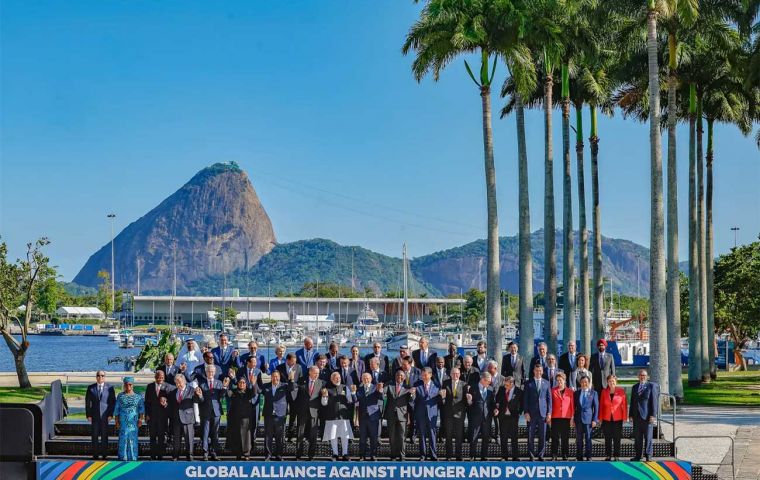MercoPress. South Atlantic News Agency
Rio G20 Declaration signed – Argentina adheres only partially
 The document also enshrines Brazil's achievements while holding the G20 rotating presidency under Luiz Inácio Lula da Silva this year
The document also enshrines Brazil's achievements while holding the G20 rotating presidency under Luiz Inácio Lula da Silva this year G20 Leaders Monday signed at the Brazilian city of Rio de Janeiro a joint 85-item declaration in which they addressed the world's current challenges. However, Argentine President Javier Milei announced he would not be endorsing the so-called 2030 Agenda goals.
Among the most relevant points was the signatories' warning that measures taken to combat climate change, including unilateral ones, should not be a tool of arbitrary and unjustifiable discrimination or a disguised restriction on international trade. They also focused on the international political and economic situation; the defense against hunger and poverty; sustainable development; energy transition and climate action; and the reform of global governance institutions. In addition, they agreed on the need for a “collective responsibility for the effective management of the global economy,” plus a commitment to the achievement of the Sustainable Development Goals (SDGs).
There was consensus on the struggle for a world free of nuclear weapons, the condemnation of terrorism “in all its forms and manifestations” and the peaceful resolution of conflicts as people face inequality and economic uncertainty in addition to the “human suffering and the adverse impact of wars.”
The leaders also underlined that urgent action was required to boost the meager progress so far exhibited by the 2030 SDGs while promoting progressive fiscal policies to favor growth and attract public and private investments.
Boas vindas ao presidente da Argentina, Javier Milei, na Cúpula do G20 no Brasil. pic.twitter.com/s3HBEIvVM5
— Lula (@LulaOficial) November 18, 2024
Regarding the ongoing armed conflicts, the G20 insisted on abiding by the United Nations Charter and other pieces of international law. The “catastrophic situation in the Gaza Strip and the escalation in Lebanon” and the conflict in Ukraine were of particular interest. The signatories also called for the urgent expansion of humanitarian aid and the protection of civilians while reaffirming Palestine's right to self-determination through a two-state solution to achieve a lasting ceasefire.
The document also addressed a much-called-for reform to the UN Security Council to meet “the realities and demands of the 21st century,” which would put an end to the under-representation of regions and groups in Africa, Asia-Pacific, Latin America, and the Caribbean. The World Bank (WB) and the International Monetary Fund (IMF) were also urged to procure that developing countries have their own voice in those forums.
The Rio G20 declaration also mentioned the “urgency and seriousness of climate change” which leads to stepping up “efforts to contain the increase in global average temperature to 1.5 degrees Celsius [...] above pre-industrial levels.” Attention was also given to the commitment to reduce greenhouse gas emissions as well as the use of fossil fuels through the production of “clean, sustainable, fair, affordable energy” in line with the SDGs, the Paris Agreement, and COP28.
The document also enshrines the achievements of the Brazilian G20 presidency under Luiz Inácio Lula da Silva throughout the year, such as the Global Alliance against Hunger and Poverty, the Task Force on Global Mobilization against Climate Change, and the Call to Action on Global Governance Reform.
Meanwhile, Milei's Government said it did not hinder the final declaration but would not accompany those points linked to the 2030 Agenda. Buenos Aires also insisted that international cooperation was “in crisis.”
The Argentine government “signed the declaration of presidents partially dissociating itself from all the content linked to the 2030 Agenda,” announced a statement from the Office of the President of the Argentine Republic (OPRA). “Without hindering the declaration of the other leaders,” Milei “has made it clear that, in his participation of the G20, he does not accompany several points of the declaration,” the statement read.
Among the points Milei does not support are:
- “The promotion of the limitation of freedom of expression in social networks”
- “The scheme of imposition and infringement of the sovereignty of global governance institutions”
- The “unequal treatment before the law” and the “notion that state intervention is the way to fight hunger”
“If we want to fight hunger and eradicate poverty, the solution lies in getting the state out of the way,” the OPRA also underlined after Milei repeatedly recommended “deregulating economic activity” to facilitate free trade in the belief that the exchange of goods and services “is what brings prosperity.”
“Free market capitalism” is what has already lifted 90% of the population out of extreme poverty and doubled life expectancy, the Argentine Government argued while acknowledging that international bodies and forums such as the G20 were created in the spirit of safeguarding people's basic rights.
“Today, almost 70 years after the inauguration of this system of international cooperation, the time has come to recognize that this model is in crisis because it has long been at fault with its original purpose,” Buenos Aires underscored.




Top Comments
Disclaimer & comment rules-

Read all commentsMilei is switched on! Go Milei, go!
Nov 21st, 2024 - 01:44 pm 0Commenting for this story is now closed.
If you have a Facebook account, become a fan and comment on our Facebook Page!